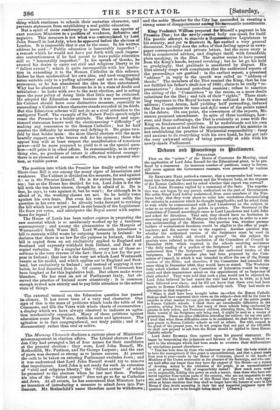King Frederick W il liam prepared far himself a pageant in his
Prussian Diet; but the newly-created body can speak for itself.
His puerile attempt to concede a Rep tative Legislature to his country, and yet to frustrate it, bas excited a very general i
discontent. Not only does the reflex of that feeling appear in news- piper correspondence and private letters, but the same story is told in commercial advices, and displays itself, with formidable plain speaking, in the Diet. The matter seems to have passed from the King's hands, beyond revoking ; but he let go his hold so grudgingly, that gratitude is smothered by disgust. His Diet already rings with complaints that the authorized reports of the proceedings are garbled : in the earliest report, a promised "address" in reply to the speech was called an "address of thanks." The members of the Diet remind the King, that he has not fulfilled his father's draft-law of 1820; claim to be really " re- presentatives" ; demand periodical sessions ; refuse to sanction the sitting of the " Committees " in the recess, as a more docile substitute for the Diet ; and talk of their " rights." These start- ling responses to the Royal lecture were softened in the formal address; Count Arnim, half yielding half persuading, induced the Diet to moderate its tone and defer some of the points raised in the debate. On one point, the correctness of the reports, nisters promised amendment. In spite of these 'soothings, how- ever, and these softenings, the Diet is evidently at issue with the King on fundamental questions. If he understands not his own position, he must at least feel the inconveniences of his mistake in not establishing the practice of Ministerial responsibility : fussy and anxious to do everything with his own hand, he has got into the very awkward scrape of being personally at odds with his newly-made Parliament.


























 Previous page
Previous page